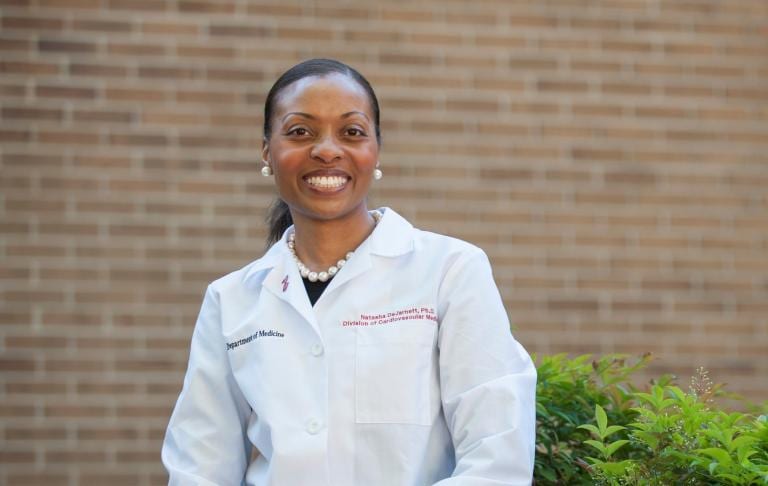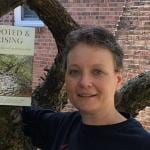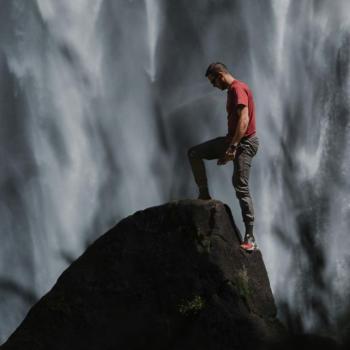This the third in a series of posts celebrating a “green” Black History Month. This series is highlighting four authors from Rooted and Rising: Voices of Courage in a Time of Climate Crisis (Rowman & Littlefield, 2019) who help us understand the connections between race, climate, and justice. In this segment, we meet Dr. Natasha DeJarnett Ph.D., M.P.H., research coordinator at National Environmental Health Association where she leads research as well as children’s environmental health activities. She is a graduate of the University of Louisville in Kentucky, where she completed her Ph.D. and Masters of Public Health concentrating in environmental health sciences. Dr. DeJarnett is also a member of the Governing Board of Citizens’ Climate Education.

“The View from My Window”
My co-editor, Margaret Bullitt-Jonas and I were first introduced to Dr. DeJarnett by Peterson Toscano, host of Citizen’s Climate Radio. He interviewed Dr. DeJarnett for his podcast episode “Race, Pollution, and Justice,” and we knew her perspective on climate and public health would be important to include in our book. What surprised me is that Dr. DeJarnett is a native of my new home state – Kentucky. She begins her chapter describing what it was like to gaze out her childhood window in Georgetown, Kentucky, in 2007, before moving away to graduate school.
“Trees filled the landscape – maple, ash, redbud, and oak reaching for the endless blue sky, towering over neighbors who walked their dogs and chatted with each other as they strolled the streets that framed the lake. Flowerbeds adorned the hillside – tulips, day lilies, and daffodils. On my desk were pictures I had taken of these flowers – the details of their petals and leaves showing the generosity of God. The idea that God puts that amount of attention into one single flower and gives us millions of them, amazed me.
“As I stood by the open window, I felt the breeze on my face and heard the sound of children laughing outside. I imagined they were chasing each other across the yards as I did with my friends when we were kids. From my window, I could see hope and a future.”
But when she returned a decade later to visit, she was dismayed to find the landscape through that window had changed.
“The lake is shrinking. A quarter of the trees are gone, killed off by extreme weather events and a devastating ash borer infestation. Many of the beautiful flowers have disappeared because they no longer have shade. Gazing out the window today, armed (and sometimes burdened) with additional insight, I wonder what my future children will see from this window. Will they see the beauty I experienced in my childhood, or will climate change continue to alter the landscape?
“Beyond that, I wonder how it will affect their health. Will I hear them outside laughing, chasing each other up and down the hills? Or will climate-related health threats prevent them from sharing the experiences that I enjoyed?”
Dr. DeJarnett’s postdoctoral fellowship concentrated on air pollution and heart disease. This led her to explore the intersection of climate change and public health.
“My role in addressing climate change and health has largely been to inform policy,” she explains. “This means that I educate. To leaders in public and environmental health and policy, I provide educational tools that equip them to make informed decisions on policies to protect health as the climate changes. In addition, I provide education for the general public. I hope this will build a groundswell of advocates who will call on their policymakers to act on climate to safeguard health.”
Dr. DeJarnett stresses that climate-related health issues disproportionately impact people living in impoverished areas and communities of color. Those who are socially isolated, like the elderly or people with language barriers are also at greater risk. And children playing outdoors or living in homes without air-conditioning are particularly vulnerable.
“As a person of color who suffered from asthma attacks as a child, this reality hits home for me,” she adds. Her own mother and other family members have suffered from the effects of extreme heat and air pollution, making her work deeply personal.
“I’ve often heard it said that we are the first generation to experience the impacts of climate change and the last that can do something about it,” she says.
“For my part, I’m seeing those impacts from climate change in the form of severe threats to public health that worsen pre-existing health conditions and exacerbate health inequities.”
She notes that each year, seven million people die worldwide because of air pollution – a completely preventable malady. But for communities of color (where polluting industries often locate their plants) and those living on the fence-lines of industrial polluters or near highways, the risks are often inescapable.
In Dr. DeJarnett’s work, she emphasizes that communities must find ways to help citizens adapt to the changing climate in order to protect public health. “That means we need accessible cooling stations for extreme heat days, poor-air-quality alerts. We need evacuation plans for extreme weather events that enable all vulnerable populations to be transported to safety,” she explains. “In addition to taking action steps to adapt, we must also advocate for climate change mitigation strategies. These will reduce the release of pollutants and safeguard our health from further climate harm.”
How does she cope with the feelings of despair or being overwhelmed that arise in her work?
She draws on the life lessons from her family and her community who modeled resiliency and public service in the face of oppression. And she leans on her Christian faith that has taught her the importance of being good stewards of God’s Creation. “In doing this work,” she says, “we must be grateful, mindful, prayerful, and dedicated to taking action. One verse has echoed throughout my life, ‘To whom much is given, much is required’ (Luke 12:48).”
Dr. DeJarnett shares more about her journey, including how her father taught her the value of “putting hands and feet to hope” through voter registration drives in Kentucky. You can find her chapter, “The View from My Window” in Rooted and Rising: Voices of Courage in a Time of Climate Crisis.
[Read more about the connection between climate, faith, and health in this piece Dr. DeJarnett and I wrote for Climate for Health and Blessed Tomorrow: “Faith, Health, and Climate: Finding Connections and Building Bridges.”]
Read also:
“Green” Black History Month: Spotlight on Rev. Dr. Gerald Durley
Race, Faith, and the Climate Movement: Interview with Rev. Lennox Yearwood, Jr.

Leah D. Schade is the Assistant Professor of Preaching and Worship at Lexington Theological Seminary in Kentucky and ordained in the ELCA. Dr. Schade does not speak for LTS or the ELCA; her opinions are her own. She is the author of Preaching in the Purple Zone: Ministry in the Red-Blue Divide (Rowman & Littlefield, 2019), Rooted and Rising: Voices of Courage in a Time of Climate Crisis (Rowman & Littlefield, 2019), and Creation-Crisis Preaching: Ecology, Theology, and the Pulpit (Chalice Press, 2015).
Leah’s latest book is a Lenten devotional centered on Creation: For the Beauty of the Earth (Chalice Press, 2020).
Twitter: @LeahSchade
Facebook: https://www.facebook.com/LeahDSchade/













